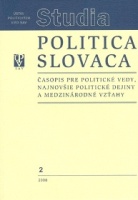Political Institute of the Central Committee of the Communist Party of Czechoslovakia
Vysoká škola politická ÚV KSČ
Author(s): Peter DinušSubject(s): Politics / Political Sciences
Published by: Ústav politických vied Slovenskej akadémie vied
Keywords: institute; politics; education; Communist Party; Czechoslovakia
Summary/Abstract: Following the takeover of power in the February of 1948, the Communist Party of Czechoslovakia (CPCz – KSČ) made efforts to streamline the system of its party and political education. Their ambition was to bring this system to a qualitatively higher level by offering political education of members of the CPCz through short-term courses organized by the party-political school of a college type. The institute was to provide activists of the Communist Party of Czechoslovakia and members of the Party elite with university education equivalent to that provided by state universities and colleges. This effort resulted in the establishment of the Political Institute of the Central Committee of the Communist Party of Czechoslovakia, which developed its activity in the period of 1953-1990. The Political Institute of the Central Committee of the Communist Party of Czechoslovakia (PI CC CPCz) was under the supervision of the CC CPCz in terms of content, personnel and economic management. From 1970, the institute’s position was that of a department of the CC CPCz which, therefore, delimited the powers and responsibilities of the rector, deputy rector and other offi cials within the apparatus of the Communist Party. PI CC CPCz closely collaborated with the departments of the CC CPCz, mainly with the Ideological Department (in dealing with the issues of content) and Political-Organizational Department (in dealing with personnel issues). Initially, the institute was unable to provide education equivalent to state universities and colleges, even though it made every effort to that effect throughout the 1950. The problem was not so much that of the form (the structure of the institute and the education system) as that of the content, that is, the standard of the presented material. Some of the disciplines did meet academic criteria, but not until the 1960s. These were particularly humanities – Czechoslovak history and general history, the history of political theories, political science, social science, management theory to name a few. In the period of normalisation (after 1970) the element of learning by rote prevailed over the congitive element due to a stereotyped approach to the objectives of the educational process. This was the result of the circumstance that the institute was preparing Communist activitsts and offi cials for a top-down administrative system of control.
Journal: Studia Politica Slovaca
- Issue Year: I/2008
- Issue No: 2
- Page Range: 14-32
- Page Count: 19
- Language: Slovak

